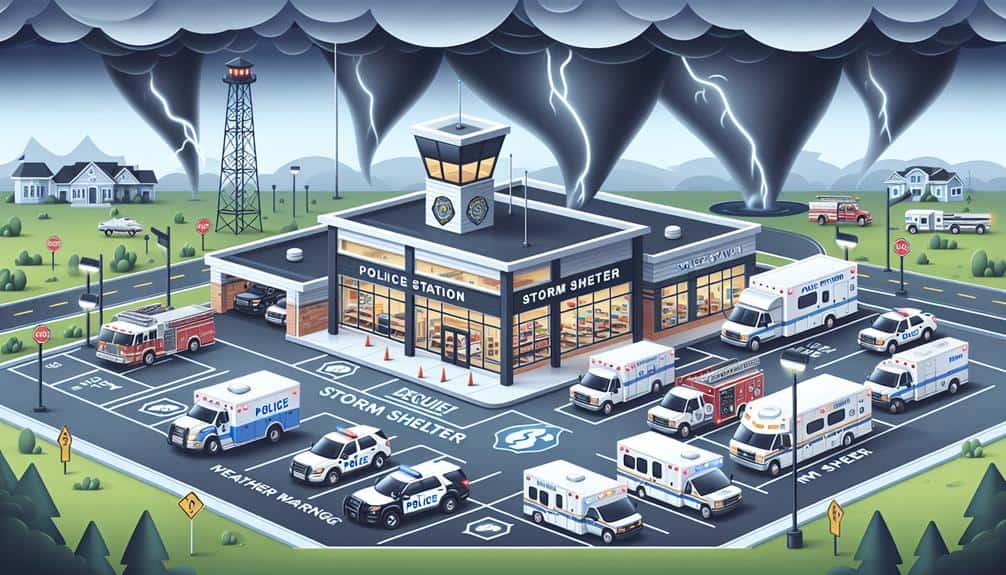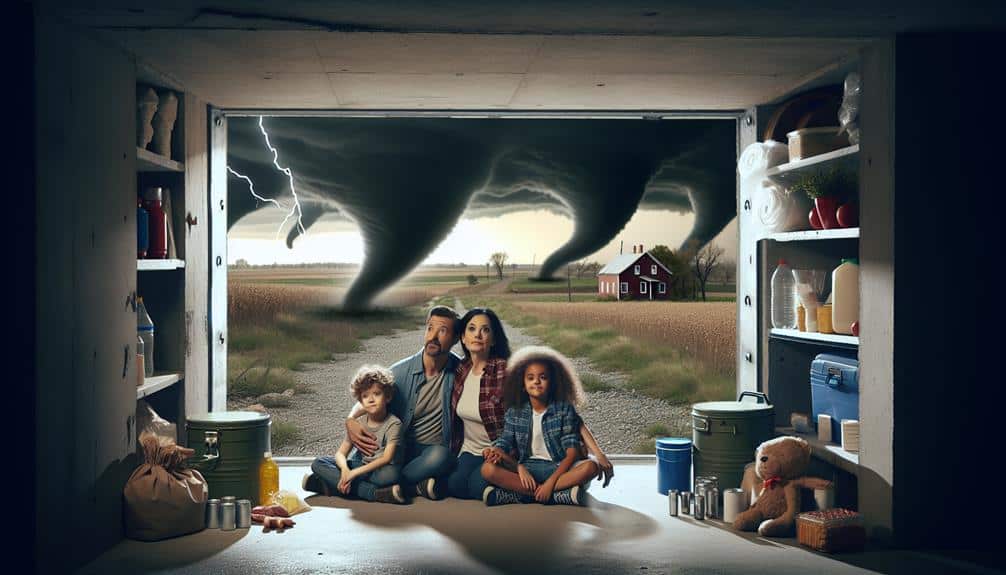As RV travelers, it's important that we are aware of the top storm shelter locations to guarantee our safety during severe weather. Community centers, typically located near parks or shopping malls, are equipped with essentials like first aid kits and water. Public libraries, with their strong structures, provide access to weather updates and Wi-Fi. Rest areas offer well-lit, monitored shelters with amenities like gas stations and indoor dining. Campground facilities have durable restrooms and nearby gas stations that may provide shelter. Police stations are dependable with backup generators and emergency personnel. We'll investigate these choices to remain ready and secure.
Key Points
- Community centers are strategically located and equipped with essentials like first aid kits and water.
- Public libraries offer robust structures, Wi-Fi, and charging stations for connectivity.
- Rest areas provide accessible shelters with amenities like gas stations, convenience stores, and indoor dining areas.
- Campground facilities include sturdy restrooms and community centers, with potential nearby gas stations for refuge.
Community Centers
Community centers often serve as reliable storm shelters for RV travelers seeking safety during severe weather. We can't emphasize enough how essential it's to know where these centers are located.
Many community centers are strategically positioned near local parks or shopping malls, making them accessible and easy to find. When severe weather threatens, these centers often open their doors to the public, providing a safe haven equipped with essentials like first aid kits, water, and sometimes even basic amenities like showers and cots.
Knowing the layout of local parks and shopping malls can be invaluable. These areas frequently have clear signage directing you to the nearest community center, which could be a lifesaver in a storm. Community centers often have reinforced structures designed to withstand high winds and heavy rain, making them a prudent choice for storm shelter.
As freedom-loving RV travelers, we must always prioritize safety without compromising our sense of adventure. Being aware of nearby community centers and their proximity to local parks or shopping malls ensures we're ready for any sudden weather changes. This knowledge empowers us to explore confidently, knowing we've safe options when nature turns unpredictable.
Public Libraries
Public libraries often serve as important storm shelters for RV travelers, providing a sturdy refuge equipped with necessary resources during severe weather events. We should always keep these institutions in mind when we're on the road and a storm hits. Libraries are built to be robust structures, often able to withstand harsh weather conditions, making them a reliable choice for safety.
When we seek shelter in a public library, we gain access to more than just a safe space. These facilities offer a quiet study environment, which can be a comforting oasis amid the chaos of a storm. Additionally, resource access is a significant advantage. Libraries provide essential information about local weather updates, emergency services, and community resources, all of which can be vital during and after a storm.
Moreover, public libraries often have Wi-Fi and charging stations, allowing us to stay connected with family and friends or keep abreast of changing weather conditions. They frequently have staff who are knowledgeable and can guide us to other local resources if needed. For those of us valuing freedom and preparedness, knowing the location of nearby public libraries can make a significant difference in our safety and peace of mind.
Rest Areas
When public libraries offer an important refuge during storms, rest areas along highways also provide accessible shelters for RV travelers seeking immediate safety. These spots are strategically placed and often come equipped with amenities that can be lifesavers during severe weather.
Many rest areas feature robust buildings that can withstand strong winds and offer protection from flying debris.
Gas stations and convenience stores located within or near rest areas are invaluable. They not only provide essential supplies like food, water, and fuel but also serve as gathering points where we can get real-time updates on weather conditions. In addition, these locations are often well-lit and monitored, which enhances our safety and security.
Moreover, rest areas frequently host restaurants and fast food chains, making it easy to grab a quick meal without venturing far from shelter. Having access to indoor dining areas offers another layer of protection, as these establishments are generally constructed to endure harsh weather conditions.
When traveling in an RV, it's essential to have a plan for storm safety. Identifying rest areas as potential shelters guarantees we've immediate options that combine convenience, safety, and essential services.
Campground Facilities
Many campgrounds offer robust facilities that can serve as critical shelters for RV travelers during severe weather. When storms are imminent, campground facilities like sturdy restrooms, laundry rooms, and community centers provide a safe haven. These structures are typically built to withstand harsh conditions better than our RVs, giving us a secure place to wait out the storm.
Nearby local parks often have similar robust facilities. Many parks come equipped with visitor centers and pavilions that can offer protection. It's wise to familiarize ourselves with these locations upon arrival and assess their construction and accessibility. Knowing where the nearest solid structure is can make all the difference when a storm hits.
Gas stations adjacent to campgrounds can also be potential shelters. Many gas stations have convenience stores built with reinforced materials. While not as ideal as purpose-built storm shelters, they can provide a safer alternative to staying in an RV. Always check with the station's management to understand their policy on seeking refuge during severe weather.
Police Stations

Recognizing police stations as reliable storm shelters is crucial, as these facilities are typically designed to withstand extreme weather conditions. When we're on the road in our RVs, knowing where to find sturdy, secure shelter can make a significant difference.
Police stations aren't just well-constructed, but they also have trained personnel who can offer assistance during emergencies. In many communities, police stations are centrally located, making them easily accessible.
Unlike gas stations or convenience stores, which may not provide robust protection, police stations are built to endure severe weather events. Additionally, police stations often have backup power generators, ensuring that they remain operational even if the power grid fails.
However, it's vital to stay mindful of other viable options, such as schools and churches, which also function as community storm shelters. These buildings often have large, reinforced structures designed to safeguard many people.
Nonetheless, police stations stand out because of their around-the-clock availability and the presence of emergency personnel. While we value our freedom on the open road, having a mental map of these secure locations guarantees that we're ready for any sudden weather changes. Staying informed can be crucial in ensuring our safety during our travels.
Frequently Asked Questions
What Should I Pack in an Emergency Storm Shelter Kit for RV Travel?
Did you know that 30% of RV travelers face storms? We should pack emergency supplies like water, non-perishable food, first-aid kits, flashlights, and shelter essentials such as blankets and extra clothing for unpredictable weather.
How Do I Find Storm Shelters While Traveling in Rural Areas?
To find storm shelters while traveling in rural areas, we should research local emergency services, use weather apps, and connect with fellow remote camping enthusiasts. Staying informed enhances our emergency preparedness and keeps us safe.
Are There Mobile Apps to Locate Nearby Storm Shelters for RV Travelers?
Coincidentally, we've found several mobile apps that help locate nearby storm shelters. They provide emergency alerts and community resources to keep us safe on the road. Let's stay vigilant, ensuring we always know our nearest refuge.
What Are the Safest Types of RVS During Severe Weather?
When considering RV safety during severe weather, we should prioritize hard-sided RVs over pop-ups or travel trailers. They offer better protection against high winds and flying debris, ensuring we take the best severe weather precautions.
How Can I Prepare My RV for a Storm While on the Road?
Remember the boy scout motto, 'Be prepared.' We monitor weather alerts constantly and stock up on emergency supplies like water, non-perishables, and first aid kits. It's essential to secure loose items and know evacuation routes.


